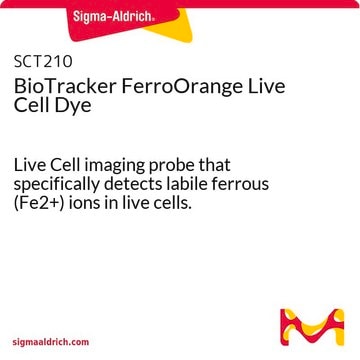SCT240
BioTracker™ Blue TFCH Oxidative Stress Probe
Sinónimos:
Live Cell Imaging Probe
About This Item
Productos recomendados
origen biológico
human
Nivel de calidad
mol peso
calculated mol wt 280.63 kDa
envase
vial of 1 mg
fabricante / nombre comercial
Millipore
modo de crecimiento
N/A
técnicas
cell based assay: suitable
flow cytometry: suitable
immunofluorescence: suitable
método de detección
fluorometric
Condiciones de envío
dry ice
temp. de almacenamiento
−20°C
Descripción general
Aplicación
Características y beneficios
Forma física
Almacenamiento y estabilidad
Otras notas
Información legal
Cláusula de descargo de responsabilidad
Palabra de señalización
Warning
Frases de peligro
Consejos de prudencia
Clasificaciones de peligro
Eye Irrit. 2 - Skin Irrit. 2 - STOT SE 3
Órganos de actuación
Respiratory system
Código de clase de almacenamiento
11 - Combustible Solids
Clase de riesgo para el agua (WGK)
WGK 3
Certificados de análisis (COA)
Busque Certificados de análisis (COA) introduciendo el número de lote del producto. Los números de lote se encuentran en la etiqueta del producto después de las palabras «Lot» o «Batch»
¿Ya tiene este producto?
Encuentre la documentación para los productos que ha comprado recientemente en la Biblioteca de documentos.
Nuestro equipo de científicos tiene experiencia en todas las áreas de investigación: Ciencias de la vida, Ciencia de los materiales, Síntesis química, Cromatografía, Analítica y muchas otras.
Póngase en contacto con el Servicio técnico







